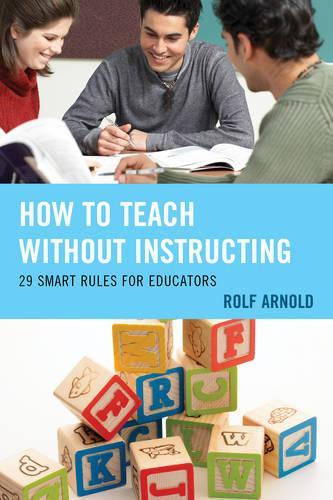
How to Teach without Instructing: 29 Smart Rules for Educators
(Paperback)
Available Formats
Publishing Details
How to Teach without Instructing: 29 Smart Rules for Educators
By (Author) Rolf Arnold
Bloomsbury Publishing PLC
Rowman & Littlefield Publishers
3rd June 2015
United States
Classifications
Professional and Scholarly
Non Fiction
Educational psychology
Educational strategies and policy
371.3
Physical Properties
Paperback
194
Width 154mm, Height 226mm, Spine 15mm
308g
Description
Teaching and learning are two interrelated terms used to express our thinking about a major aspect of human development. However, didactics developed into an art, the art of teaching, while the processes of learning were neglected and not researched. Nowadays, many people perceive learning as an undesirable activity. The experience of learning is thought of as something expected of them from the outside and it is often remembered as stressful, a pressure to perform, a fear of failure, and alienation. But there are also some enriching experiences such as the joy of discovery, to ultimately achieve after many attempts something that you could not do previously, or to see a situation in a new light. How to Teach Without Instructing relinks teaching and learning. It examines the teaching practices in institutions of learning and formulates rules that assist teachers in their efforts to focus their teaching on the learner. The rules are based on situations that are routinely encountered in the teaching environment.
Reviews
This is a thought-provoking book written by Rolf Arnold, a German professor of adult education. I would recommend this book, particularly as a course text for teacher training. What stands out in this book is Arnolds passion for wanting to assist educators to move away from traditional instructive practice. When read carefully this book has a powerful capacity to encourage teachers to reflect on their teaching practice, and thus this book is also particularly useful to help teaching practitioners understand why and how they should move away from traditional instruction. I would also therefore recommend this book for all educators who are actively seeking to improve their teaching competencies. Finally, the LENA learning model framework is of significant importance in this book and provides an excellent comparison to other internationally recognized models. * Adult Education Quarterly *
In How to Teach without Instructing: 29 Smart Rules for Educators Rolf Arnold presents answers to the question that support teachers in their effort to put more emphasis on the student perspective in their teaching and thereby enable self-paced, sustained learning. He is consistently true to his thesis that learning is, at its core, always self-directed and he provides a wide range of practical experience in suggesting opportunities for future action. He is not lecturing, but rather encouraging, motivating, thoughtful, and refreshingchallenging the reader to choose tomorrow to venture out on their own, or to continue down a familiar path. -- Dr. Hanns Petillon, professor, Institute for Childhood and Adolescent Education, University of Koblenz-Landau, Germany
The two most important keystones for a successful learning process are liveliness and sustainability. Rolf Arnold has developed in this sense a system of twenty-nine instructions for teaching to bolster the courage and ability of the teachers for creating various and imaginative arrangements of learning. This is a book to use in practical situations in school, university, or other institutions of education. Readers find checklists, questionaries for self-reflection, and case studies. -- Dr. Christiane Griese, professor, Institute for Education, Technical University of Berlin, Germany
Author Bio
Rolf Arnold, PhD, obtained his doctorate at the University of Heidelberg, worked thereafter in an International Adult Education Centre, obtained his postdoctoral qualification at the Distance University of Hagen, Germany, in 1987, and has been working since 1990 at the Department of Pedagogics (in the fields of Vocational and Adult Education) at the Technical University of Kaiserslautern, Germany. He is also Scientific Director of the Distance and Independent Studies Center (DISC), and the Speaker of the Virtual Campus RhinelandPalatinate (VCRP).
